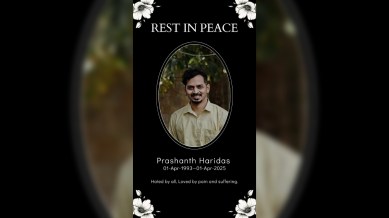‘Rest in peace’: Bengaluru man writes obituary for his job hunt in viral LinkedIn post after 3 years of rejections
Prashanth Haridas used the platform not just to express his frustration but to make an emotional statement aimed at recruiters who he felt had repeatedly “ghosted” him.

After three years of unemployment, Bengaluru-based Prashanth Haridas turned to LinkedIn in a moment of raw vulnerability—posting what resembled an obituary for his job search. Feeling ignored and deeply disheartened by the hiring process, he used the platform not just to express his frustration but to make a bold, emotional statement aimed at recruiters who he felt had repeatedly “ghosted” him.
“Thank you, LinkedIn, for everything. Thank you, industry leaders, for ghosting and ignoring me. Thank you for making me spend money on self-grooming so you can ghost me,” he wrote in a post that quickly gained traction. Accompanying his words was a photo of himself with the text “Rest in peace” superimposed.
monthly limit of free stories.
with an Express account.
To avoid any misinterpretation, Haridas added a crucial clarification: “P.S.: I’m not gonna kill myself. Have a lot of things to do, cuisines to taste and places to visit. Just dead, trying to get a job, fix things, and be with the love of my life. Being unemployed for close to 3 years and being isolated is very hard.”
See the post:
The brutally honest post struck a chord with thousands on LinkedIn, prompting a flood of responses ranging from concern and empathy to criticism and unsolicited advice.
One user commented, “I’m sorry to hear what you are going through. I cannot begin to imagine. Please take care of your mental and emotional health.”
Another user said, “His only post where he received the most reactions and impressions—sadly, this is the reality. Please take care and connect with me. I might be able to share something that helps. Your post shocked me—I choked on my food!”
A third user reflected on the broader hiring culture: “LinkedIn has become a joke, and so is this new ‘automated’ hiring process.”
However, not all responses were supportive. One user said, “Hi Prashanth Haridas, let me give you a reality check. Your profile shows frequent job changes—that alone can deter companies. Jobs are given based on skills, not sympathy. Also, I didn’t think it was appropriate to mention your girlfriend after a breakup on a public platform. You’re hurting her dignity for your own benefit. Please look for jobs more professionally.”
The post sparked a broader conversation about how platforms like LinkedIn are evolving. Once a place strictly for professional updates and networking, it’s increasingly become a space where people share personal struggles tied to work and job-hunting.
Not long ago, another professional—Kamlesh Kamtekar, a graphic designer from Mumbai with over 14 years of experience—opened up about being laid off. Despite his rich portfolio, Kamlesh couldn’t find new work and eventually decided to start driving an autorickshaw to make ends meet.